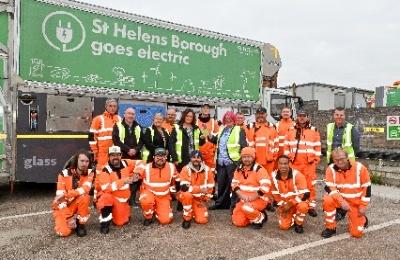St Helens Borough Council wins national award for recycling and food waste prevention
St Helens Borough Council has received national recognition for its outstanding efforts to promote recycling and reduce food waste across the borough.

Article date: 20 October
The council's recycling team was shortlisted in two categories at the LARAC Conference Celebration Awards, held in Birmingham this month, which celebrates excellence in local authority recycling and waste management.
The team won the Best Waste Minimisation or Prevention Award for an innovative project delivered in partnership with several local schools. The initiative raised awareness among children about food waste recycling and prevention, while also piloting food waste collections in school kitchens. As a result, over 1,500kg of food waste was successfully recycled, with participating schools reporting significant reductions in overall waste.
St Helens Borough Council triumphed over strong competition from Lincolnshire County Council and the London Borough of Islington.
Councillor Tracy Dickinson, Cabinet Member for Neighbourhoods and Environmental Services, said:
"We're absolutely delighted to receive this national recognition for our work to encourage recycling and reduce food waste. This award reflects the dedication of our Recycling Team and the positive impact of our partnership with local schools.
"With our borough-wide food waste recycling service now relaunched, it's more important than ever to keep spreading the message about how small changes—like using the right containers and separating waste correctly—can make a big difference.
"This award shows the real progress we're making together, and we're committed to building on that success. Thank you to everyone who continues to support our efforts toward a more sustainable St Helens."
Just 0.16% of recycling collected in St Helens Borough is rejected due to contamination — the lowest rate in the North West. Having a separate bag or container for each material, such as cardboard, paper, plastic and glass, helps to prevent contamination that often occurs when items are mixed together in one bin.
Despite all local authorities being required by Government to introduce a domestic weekly food waste collection service to all households by March 2026, St Helens Borough Council has been ahead of the curve for more that a decade, having introduced its food waste collection service in 2013.
So far in 2025, crews have collected over 12,000 tonnes of recycling, including these key materials:
- 2,308 tonnes of cardboard
- 581 tonnes of mixed glass
- 1,313 tonnes of plastics
- 4,103 tonnes of garden waste
- 1,732 tonnes of food waste
To help residents recycle food waste properly, the council is delivering more than 80,000 rolls of food waste caddy liners to homes across the borough. Collected food waste is taken to ReFood in Widnes, where it goes through an eight-step process to turn it into biogas for the National Grid — potentially supplying energy to up to 12,600 homes each year.
For more information on recycling in St Helens Borough, including ordering additional containers, visit: www.sthelens.gov.uk/recycling
